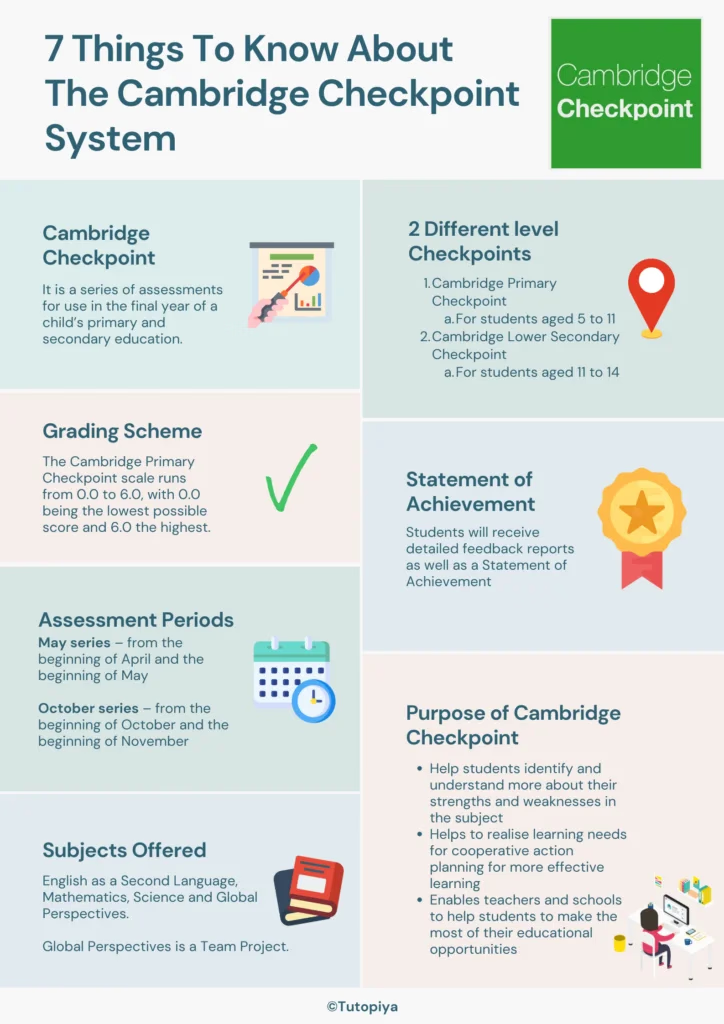
7 Things To Know About The Cambridge Checkpoint System
What is Cambridge Checkpoint?
Cambridge Checkpoint is a series of assessments for use in the final year of a child’s primary and secondary education. It allows schools to obtain an international benchmark of the students’ to identify and address learning needs.

What does Cambridge Checkpoint offer?
The Cambridge Checkpoint offers 2 different levelled assessments - Cambridge Primary Checkpoint and Cambridge Lower Secondary programme.
Cambridge Primary Checkpoint is for students aged 5 to 11 years old whereas Cambridge Lower Secondary programme is meant for students aged 11 to 14.
What subjects does the Cambridge Checkpoint assessment offer?
There are Cambridge Checkpoint tests for English, English as a Second Language, Mathematics, Science and Global Perspectives.
For English, English as a Second Language, Mathematics and Science, Cambridge Primary & Secondary Checkpoint tests are fully marked by Cambridge International. The Cambridge Primary and Secondary Checkpoint assessment for Global Perspectives is a Team Project. Teachers mark the work and Cambridge moderates the marking.
What is the Cambridge Checkpoint used for?
Cambridge Primary and Secondary Checkpoint purposes
- Help students identify and understand more about their strengths and weaknesses in the subjects at the end of their primary and lower secondary education respectively
- It helps parents and teachers, as well as themselves, to realise learning needs for cooperative action planning for more effective learning
- It enables teachers and schools to help students to make the most of their educational opportunities
When can you take the Cambridge Checkpoint Assessments?
Both Cambridge Primary Checkpoint and Lower Secondary Checkpoint, have the same assessment periods.
May series – from the beginning of April and the beginning of May
October series – from the beginning of October and the beginning of November
How are the students graded?
The tests are marked by Cambridge International for English as a first or second language, mathematics and science.
The assessment/ grading system
The Cambridge Checkpoint scale runs from 0.0 to 6.0, with 0.0 being the lowest possible score and 6.0 the highest.
| Checkpoint score | Predicted IGCSE grade |
|---|---|
| 6 | A* |
| 5.0 to 5.9 | A |
| 4.0 to 4.9 | B |
| 3.0 to 3.9 | C |
| 2.0 to 2.9 | D |
| 1.0 to 1.9 | E |
| 0 to 0.9 | F/G |
What do the students get?
The students that sit for the Cambridge Checkpoint assessments, will all receive detailed feedback reports as well as a Statement of Achievement. This Statement of Achievement that is provided to schools is to show how well the student has performed.
In a nutshell, the Cambridge Checkpoint assessment is a great way to assess your child’s learning progress. This assessment helps students to realise their strengths and weaknesses which is vital to know to make any needed adjustments to their learning in their early years.
Read also: Quick Cambridge IGCSE Subject Guide For Students and Parents
Ready to Excel in Your Studies?
Get personalised help from Tutopiya's expert tutors. Whether it's IGCSE, IB, A-Levels, or any other curriculum — we match you with the perfect tutor and your first session is free.
Book Your Free TrialWritten by
Tutopiya Team
Educational Expert
Related Articles

How GPA Is Calculated: Complete Guide for IB, IGCSE & American Curricula
Learn how GPA is calculated across IB, IGCSE, and American curricula. Includes GPA scales, calculation methods, conversion tables, and a step-by-step GPA calculator guide.

How to Find the Best IGCSE Tutor Online in 2026: A Parent's Complete Guide
Discover how to find the best IGCSE tutor online. Compare tutoring platforms, learn what makes a great tutor, and get tips for IGCSE Maths, Physics, Chemistry, and English tutoring.

How to Study for IGCSE Exams: The Ultimate Revision Strategy for Top Grades
A complete, science-backed guide on how to study for IGCSE exams — covering revision techniques, study schedules, subject-specific strategies, and exam preparation tips.
